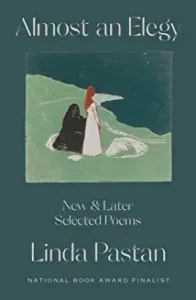Almost an Elegy: New and Later Selected Poems by Linda Pastan 2022
When Linda Pastan died last month at the age of 90, I decided to read a book of her poetry as an homage to a much-loved writer. I also was in touch with a good friend, a superb poet in her own right and a friend of Pastan’s. She was reading this volume and recommended it, for which I am grateful.
Pastan writes poetry that makes one nod in recognition, sigh with identification with the pain and sorrow in the world, and smile with the joy of a new way of recognizing its beauty. Her work calls forth all those wonderful quotes about what poetry can do, perhaps most intensely Coleridge’s words that poetry is the best words in the best order.
I love her poems, poems about her father, her garden, her marriage, her dogs, her recognition and hesitant embrace of her old age and approaching death. With this volume, she joins the chorus of my favorite poets—Hall, Frost, Ryan, Kunitz, Collins, Gluck, Kooser, Kunin.
I always read poetry with pencil and paper in hand, jotting down the titles and pages that I want to return to and often include in my review. Suffice it to say that I would have needed a ream of paper to get through this volume, but here’s one poem that I loved because it captured a feeling I had some years ago that led me to try to write a poem when I learned that a dear friend had cancer:
The Ordinary
It may happen on a day/of ordinary weather—/the usual assembled flowers,/or fallen leaves/disheveling the grass./You may be feeding the dog,/or sipping a cup of tea,/and then: the telegram;/or the phone call;/or the sharp pain traveling/thelength of your/left arm, or his./And as your life is switched/to a different track/(the landscape/through grimy windows/almost the same though/entirely different) you wonder/why the wind doesn’t/rage and blow as it does/so convincingly/in Lear, for instance./It is pathetic fallacy/you long for–the roses/nothing but their thorns,/the downed leaves/subjects for a body count./And as you lie in bed/like an effigy of yourself,/it is the ordinary/that comes to save you—/the china teacup waiting/to be washed, the old dogs/whining to go out.
There are dozens of these gems in this volume. I urge you to read it if you love poetry, and if you don’t love poetry, that’s an even better reason to read this book and then sigh, laugh, cry, and emerge with a sharper sense of what life can be.



